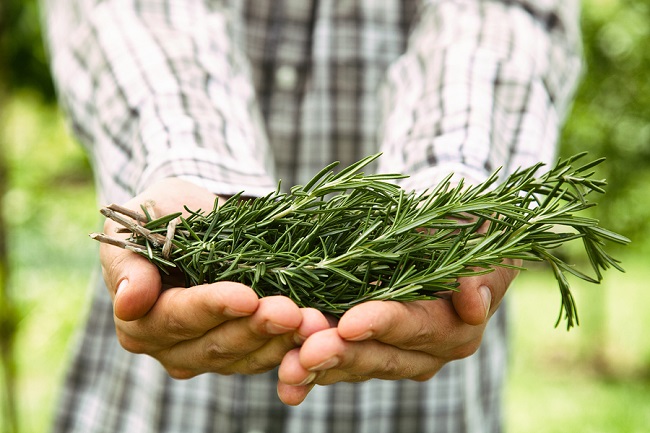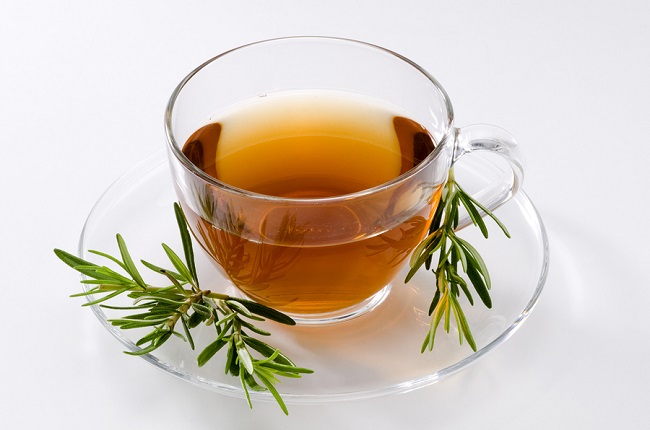- Make It Yourself Lavender Heart-Shaped Bath Bombs!
- 20 Things You Never Knew About “Down There”
- 12 Best Foods For Those Suffering From Arthritis Pain
- 12 Personal Hygiene Mistakes Almost Everyone Makes (Mom Never Told You About #4!)
- 15 Medicinal Plants And Herbs From The Cherokee People
- 12 Mind-Blowing Benefits Of Drinking Coconut Water During Pregnancy
- 12 Outstanding Winter Foods That Won’t Fatten You Up Like A Christmas Turkey
If You’re Stressed, Rosemary Can Help
There are many methods of dealing with the stress including relaxation techniques, exercise regimens, breathing techniques, and even many kinds of foods that you can eat. One of the best things to do to help yourself relax though is to inhale some essential oils.
Not all essential oils are equally as beneficial for stress though. Some of the best essential oils for relieving anxiety and stress are lavender, rose, vetiver, ylang-ylang, bergamont, chamomile, frankincense, and rosemary. Lavender is widely known to be an essential oil that will help to calm those using it. Rose essential oil is used for relieving anxiety in first-time pregnant women, and both vetiver and ylang-ylang help to create calming, grounding feelings in their users. Bergamont has been tested on rats and shown to help reduce their stress responses and it has been shown to help treat depression and anxiety, as has frankincense. Chamomile is not only useful for anxiety but also for irritability and feelings of worry.
Rosemary in particular though has shown much promise recently as many studies have been published on how it can help participants relieve stress. It seems that rosemary essential oil has a long history of being used for this purpose too, as it was used by Greek scholars during test-taking because it was thought to help improve their performance. Recent studies have shown that the scholars wearing springs of rosemary was not in vain either.
RELATED: Learn How Stress Affects Your Life And Health Infographic
The Studies
The Christine E. Lynn College of Nursing in Boca Rotan and Department of Nursing at Nambu University in Korea each conducted studies on whether the Greeks were onto something. The studies found that inhaling the rosemary essential oil had significant positive effects on the test takers. Another study published in the BMC Complimentary and Alternative Medicine journal tested rosemary essential oil as a potential treatment for mood disorders – most of which are an after-effect of dealing with stress.
This study was conducted on mice that were subjected to the tail suspension test, where the mouse is suspended by the tail and tested to see how long it takes for the mouse to stop releasing itself, and also had inhaled rosemary essential oil. The sooner the mice gave up, the more stressed they were measured to be. They also examined the effect of rosemary essential oil for cells in vitro. It was found that the inhalation of rosemary essential oil reduced the amount of time that the mice were immobile and that rosemary essential oil also increased the levels of dopamine, the ‘happiness hormone,’ in the in vitro cells.
Continue to Page 2
How To Use Rosemary For Stress Relief
Rosemary essential oil is a great way to help you out during stressful moments or times but diffusing the oil might not always be an option. A diffuser is certainly helpful to have in your home if you are in a stressful event or at the end of a stressful day to help you relax. If you don’t have rosemary essential oil, burning a spring of rosemary, or rosemary incense, also can have the same helpful effect on your mood and stress levels. If you want to use rosemary to help improve your test performance, as the Greeks did, try dabbing a few drops of rosemary mixed with a carrier oil onto your wrists before going into the test. A spring of rosemary would help too, but I’m pretty sure you’d get lots of stares if you walked into a test room with a rosemary wreath as the Greeks used to.
RELATED: Tips For A Quick 2-Minute Stress Relief
Other Benefits of Rosemary
As good as rosemary is for stress levels, the staple garden herb has even more uses than just that. Rosemary has high antioxidant activity which help to make it a powerhouse when it comes to helping improve the body in all kinds of ways. Rosemary can help reverse the loss of hair and even give it a boost at growing because of how it acts on the scalp. Rosemary is also known to increase the circulation in the body which is another reason why it might help with the growth of hair.
Rosemary also helps with any kind of ailments in the digestion process and helps to relieve muscle pains. As well as helping with digestion, rosemary can help boost the function of your liver which can detox you body easier then and can help to make your body work better overall. Rosemary can also help to relive headaches which can also be associated with its stress-relieving properties as well.
Rosemary has been know for many years to help with many kinds of ailments in the body, but recently studies have found that it can be particularly helpful against stress. At least three separate studies found that inhaling rosemary essential oil can help to relieve and reduce the chemicals associated with increased stress levels in the body and to even help promote the release of dopamine, known as the ‘happy hormone.’ Rosemary is best inhaled, such as in a diffuser, for the most effective benefits against stress, but it can also be burned as incense or inhaled by burning a spring of rosemary, in a pinch. In any case, evidence is starting to pile up that rosemary can be a great alternative way to relieve stress without the use of pharmaceuticals.
KEEP READING: The Top 25 Almost-Magical Uses For Rosemary Essential Oil (#25 Is The Best)


































